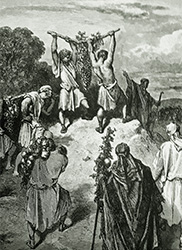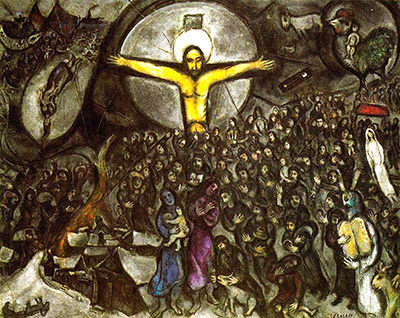Torah: Bamidbar (Numbers) 13:1 – 15:41; Haftarah: Joshua 2:1-24
The Twelve Spies
This Parashah is about the consequences of disobedience and about God’s mercy. Just as in our lives one action can have consequences reverberating through many years, so, too, the incident which begins this Parashah will have an impact in the next forty years in the lives of Israelis.
“And the LORD spoke to Moshe, saying, ‘Shelach-lecha anashim - Send forth men for yourself, and let them investigate the land of Canaan, which I give to the people of Israel; one men of every tribe of their fathers shall you send, every one a leader among them.’ And Moshe sent them from the wilderness of Paran according to the word of the LORD; all those men were chiefs of the sons of Israel.” Bamidbar 13:1-3
At a first reading it may seem that the LORD tells them to go and investigate the land, but a closer analysis of the words “for yourself” indicate that the LORD is allowing for this mission at the request of the people. Indeed, we read in Devarim 1:21 the words of Moshe explaining the incident: “Behold, the LORD your God has set the land before you; go up and possess it, as the LORD the God of your fathers has said to you; ‘fear not, nor be discouraged.’ And you approached me, every one of you, and said, ‘Let us send men ahead of us, and they shall search us out the land for us, and bring us word again by which way we must go up, and to what cities we shall come against.’ And the saying pleased me well; and I took twelve men of you, one from each tribe; and they turned and went up into the mountain, and came to the valley of Eshkol, and searched it out.”
God knows the outcome of our actions, but most of the time He does not intervene because He gives us free will to choose to follow His commandments or not. God told Israelis that He gave them the Land, He set it up before them, the only thing they needed to do was to have faith, go up, and possess it. Instead, they sent twelve spies, ten of which brought a report viewed through their humanity and limited understanding (except for Yehoshua and Caleb), disregarding God’s instruction which made people rebel against God. After all that the LORD showed them through the miracles of exodus, they still did not believe in Him. the LORD was not pleased and decreed that that generation will not enter into the Land but wander into the wilderness for forty years until every one of them will die. God punished the ten spies with instant death but showed mercy to the people allowing them forty years to die of natural causes.
This unbelief and disobedience from the leaders of the people was prevalent years later in the time of Yeshua and we are also seeing it today. Yeshua, talking with the leaders of His time, used a story to exemplify this kind of disobedience: “’What do you think? A man had two sons. And having approached the first, the man said, “My son, go today and work in the vineyard.” But the first son said in reply, “I will not.” But later, having changed his mind, he went. And having approached the other son, the man spoke similarly. But the second son, in reply, said, “I will go, sir.” Yet he did not go. Which of the two did the will of the father?’ They say, ‘The first.’ Yeshua says to them, ‘Omein, I say to you, that the tax-collectors and the sinners are going in ahead of you into the Kingdom of God.” Matthew 21:28-31. The leaders of the people who study the Torah and confess to know God’s commandments are not doing what they learned and also lead others astray, but the sinners, who initially disregard the commandments, repent and receive forgiveness ahead of the leaders.
But God in His mercy provides opportunities for everyone to repent no matter if educated or ignorant, for we further read in the Parashah, Bamidbar 15:29-41:
“’You shall have one Torah for him who sins through ignorance, both for him who is born among the people of Israel, and for the stranger who sojourns among them. But the soul who does anything presumptuously, whether he is born in the land, or a stranger, that person blasphemes the LORD; and that soul shall be cut off from among his people. Because he has despised the word of the LORD, and has broken His commandment, that soul shall surely be cut off; his iniquity shall be upon him.’ While the people of Israel were in the wilderness, they found a man who gathered sticks upon the Shabbat day. And those who found him gathering sticks brought him to Moshe and Aharon, and to all the congregation. And they put him in custody, because it was not told what should be done to him. And the LORD said to Moshe, ‘The man shall be surely put to death; all the congregation shall stone him with stones outside the camp.’ And all the congregation brought him outside the camp, and stoned him with stones, and he died; as the LORD commanded Moshe. And the LORD spoke to Moshe, saying, ‘Speak to the people of Israel, and bid them that they make them tzitzith in the borders of their garments throughout their generations, and that they put upon the tzitzith of the borders a thread of blue; and it shall be to you for a tzitzith, that you may look upon it, and remember all the commandments of the LORD, and do them; and that you seek not after your own heart and your own eyes, which incline you to go astray; That you may remember, and do all My commandments, and be holy to your God. I am the LORD your God, who brought you out of the land of Egypt, to be your God; I am the LORD your God.’”
God intended from the beginning for the Torah teaching to be for both Jews and Gentiles. God does not make a difference between people, thus His blessings and punishments are just. After making a distinction between a sin from ignorance and one made presumptuously, which is equated with blasphemy because is a direct attack on God, despising His commandments thus His authority, the Torah gives a concrete example of an intentional sin through the Shabbat violation. Torah juxtaposes the sins of idolatry and Shabbat violation because they represent the same concept. Just as the idolater denies the sovereignty of God and blasphemes, so, too, one who shows contempt for Shabbat, which testifies of God's creation of the universe, declares his lack of faith in the Creator. But then God extends His grace, He gives a practical commandment in order to help people remember His teachings and not sin, the wearing of tzitzith
The commandment of tzitzith is a vehicle that enables us to remember not only to observe the Shabbat, but all the Torah's teachings. The heart and the eyes are like the body's spies, brokering for it the sins. The heart covets and the eyes seek out, and the body sins. This Parashah begins with the spies being sent out to search the Land, but they went looking not for the things of God but for dangers that would justify their own earthly preoccupations, and they sinned. The Parashah ends with the warning not to be taken in by the lures that appeal to heart and eyes; instead, one must be ruled by his faith by looking and being preoccupied with the things of faith. Even though we are taken out of the world of sin, out of Egypt as it were, our sinful nature needs a constant practical reminder to live a holy life, and God gave us one such reminder by wearing the tzitzith
The Tallith - Prayer Shawl
The commandment of tzitzith is performed today by means of wearing the tallith and the tallith katan, the small tallith. The term tallith is derived from the Hebrew verb which means to cover. Its construction is of a rectangular shape with tzitzith, or fringes, on all four corners. The tzitzith is made of eight threads with five knots. The blue thread entwined in the fringe was its principal distinction, but, after the dispersion, the method of dying the threads sky-blue became a forgotten art, and the use of the blue thread was discontinued.
The tallith is used during early morning devotions (Shacharith prayers), for Shabbat, and Holy day worship: it is not used in the afternoon services except on the ninth of Av, and on Yom Kippur Eve. The tallith varies in size and style. It must be made either of wool, linen, or silk, but under no circumstances may the materials be mixed. The stripes in the tallith may be blue, black, or purple. To make them things of beauty, many Prayer Shawls were embroidered or ornamented; the prayer for putting on the tallith was often woven into the fabric of the neck-band, called the Attarah:
Baruch Atah Adonay Elohenu Melech Ha-olam asher kid-shanu b'mitzvotav v'tzi-vanu l'hit-a-tef ba-tzitzith.
Blessed are You, 0 Lord, our God, King of the Universe, who has sanctified us by Your commandments, and has commanded us to enwrap ourselves in the fringed garment.
In putting on the tallith the worshiper takes hold of both ends of the neck-band, kisses each side, covers his head within its folds while reciting the blessing, and then wraps the garment around his shoulders like a scarf. The tallith may not be worn upside down or inside out, thus the Attarah must always be on top and outside. When the prayers are finished the tallith is removed and carefully folded and placed in a "Tallith Bag."
Women are exempt from wearing the tallith. Boys who reach the age of Bar Mitzvah are usually presented with a tallith. It is customary to present the bridegroom with a tallith on his wedding day. It is also the custom to inter the deceased wrapped in his tallith from which the Attarah is removed and one thread of one tzitzah severed, making it patul, signifying that the duty of tzitzith no longer rests on him.
The tallith katan, or smaller tallith, otherwise known as arba kanfoth (four corners), is of a similar construction as the tallith except it has an opening in the center large enough to admit the head allowing it to be worn under the outer garment. The tzitzith must remain visible. The tallith katan is worn by the pious Jews during the entire day.
Shabbat joy, peace, and blessings! Shabbat Shalom!



